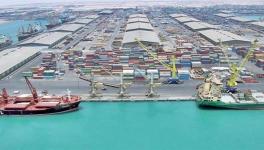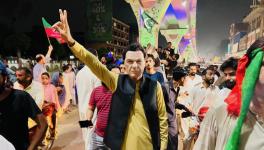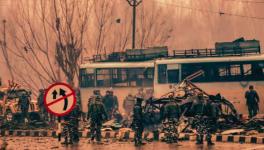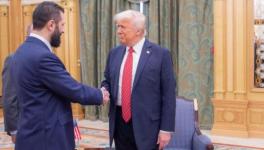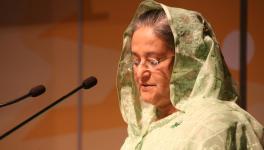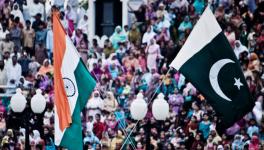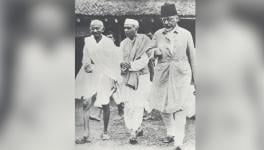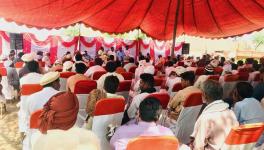The Crisis in Pakistan and its Consequences
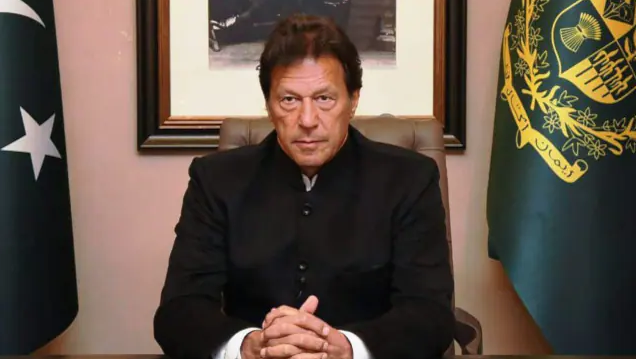
Image Courtesy: AP
“Uneasy lies the head”, Shakespeare writes, “that wears a crown”. In Pakistan, the ones prepared to play the game according to the rules set by the hegemonic powers are graced-or disgraced- to wear the crown. Thanks to the unending history of the army’s absolute control over the reins of power, the legitimacy of the power wielder, no matter an army dictator or a civilian figure, and their authority over the state control remains illegitimate in the eyes of most Pakistanis. For, they know the ruling class derives its power with the consent of the metropolitan capital and the GHQ.
Over a slight dissent, the dominant powers can withdraw the consent and replace one set of the ruling class with another eager to adjust to the designs of the real power brokers. Hence, the uneasiness of the ruling class is limited to winning the nod of the two visibly invisible gods. No wonder, living constantly under the shadow of Hades, with a barrel of a gun to its temple, Pakistani society has failed to develop the social base and historical conditions of bourgeois democracy.
Being both creators and creations of history, people learn from experience. In the global south, they are fully conversant with the outcome of the imposition of democracy from Iraq to Libya. They know that for the absence of economic content, western democracy has become a fetish, an excuse to invade countries of the global south to rob their resources. Once the countries it chooses to put on a democratic diet collapse, the western imperialist powers walk away, leaving behind anarchy. Pakistan is no exception, the war ‘of’ terror has exhausted them economically and weak democratic institutions have added to their misery hence despite frequent elections in the post-Zia-ul-Haq period the people of Pakistan have little appetite left for this futile exercise.
The 1968-69 era was the only time the people of Pakistan rose against both the metropolitan capital and native bourgeoisie with revolutionary zeal. The movement started by students spread immediately to workers and masses of both wings and led to the removal of an apparently invincible army dictator celebrating his decade of decadence. Both Mujibur Rahman and Zulfikar Ali Bhutto converted the revolutionary situation into electoral success. The massive socialism-inspired mobilisation of the radical middle class and working class was unprecedented in the history of Pakistan. Bhutto’s half-hearted attempts to introduce an Islamic version of socialism after the fall of Dhaka, his failure and ultimate repression of the working classes, led to his downfall. Later, the autocrat regime of General Zia ensured the punishment of Punjab for its radicalism. Islam was shoved down people’s throats, and through the reign of terror, the feudal and comprador bourgeoisie were imposed on the masses. The crisis of the state deepened.
Pakistan’s crisis has always been three-pronged: economic, ideological, and institutional. They have overwhelmed its superstructure—army, bureaucracy, judiciary, and political parties. None have any socio-economic program, which in turn deepened the crisis of the economic base. Each political party coming to power with scarce resources struggles to solve it but, on failing, blames the previous regimes—especially the Bhutto regime that inherited a rump Pakistan after losing its eastern colony. For his class affiliation, Bhutto was never faithful to the party manifesto of implementing socialism. Instead, he laid the basis of religious hypocrisy by declaring one religious sect as non-Muslim. And as if the fall of Dhaka was not enough, he invaded Baluchistan and gave the army a reason to unleash a regime of terror.
The demise of the Soviet Union left people with no alternative ideology to follow. To fill the vacuum, the political Islam backed by Saudi money and overt US support, which scarcely had room in the Muslim world, was brought to the fore. With the army’s backing, Nahdlatul Ulama in Indonesia, Brotherhood in the Middle East and Jamat-e-Islami in Pakistan played key roles in killing and repressing Marxist elements in each country. Younger Pakistanis, nearly over 50% of the population, have not heard about an alternative ideology barring Islam. And this, despite tall claims, could not change the material conditions of ordinary citizens.
The religious slogan-based ideology is an attempt to shift responsibility for changing the material conditions of the people to a metaphysical domain where individual piety, instead of collective effort, is given significance. Fully aware of their limitations, the political parties and those in power insist that people must follow religious tenets zealously, adding insult to the injury adding more salt to unhealed wounds. Faith based ideology not only provides the state with the logic to manage its affairs through coercive means but also gives its repressive apparatus more muscle and authenticity to subdue contradictions. The present crisis in Pakistan is not the cause but the outcome of these irreconcilable contradictions.
Bringing Imran Khan into power was an attempt to postpone the imminent crisis, whose tempestuousness was apprehended by the visibly invisible forces ruling Pakistan since its inception. The elections were engineered to divert attention from a failing economy, massive inflation, and the spectre of penury.
An army keen to grow its share of the pie in a shrinking exchequer knew that an obliged and grateful premier was more likely to give in to demands than the old politicians—representatives of the civil bourgeoisie—accustomed to bargaining with the army for bigger shares of the exploits of relentless expropriation of the masses. The tension between the civil and military bourgeoisie was at its peak during Nawaz Sharif’s era when the Panama Papers case rocked his boat.
Imran Khan’s Pakistan Tehreek-e-Insaaf was an untried Trojan horse. Despite having old corrupt members of Assemblies who always remain in power, in its fold, it was run by a charismatic, populist man of destiny eager to win power on any terms. With an unblemished past and the far-right ideology of eliminating corruption—an integral part of property structure—by building a fantasy called the medieval state of Medina, he became a ‘chosen person’ to lead the people. He mobilised the petty bourgeoisie afflicted with the religious malaise and a large section of the lumpenproletariat that saw no future in the system, in the name of honesty, a rationalization of vindictiveness. The clean-shaven version of conservative Islam gave temporary solace to their bewildering thoughts.
However, corruption is inherent in the capitalist system, as is anarchy, and donning the religious robe does not make the ruling class less parasitic. The corruption card exhausted its utility sooner rather than later. After initial hesitation, Imran was forced to approach the IMF, the metropolitan capital, to fund the army if not run the economy. The IMF followed its logic and forced the government to continuously increase the prices of electricity, gas, and consumable commodities. Even the federal bank, the symbol of state sovereignty, was bartered. The more he failed, the more he emphasised on corruption and religion, based on the mystified version of a mythological state of Medina; never realising that carving out changes to the predicates of an existing property structure, subservient to the laws of peripheral capitalism, is extremely difficult, if not impossible. Finding a solution to economic ills by deepening the ideological crisis proved counterproductive.
The army’s continuous active participation in the political field had a dialectical effect. It not only brought pelf, power, and politics within the army but also the reactionary Taliban’s version of Islam dividing it both horizontally and vertically. The extension of the COAS, the dispute on transferring the former ISI chief and the support base for Imran highlighted the cleavage within the army. If removing Nawaz exposed the political indulgence of the military in state affairs, Imran’s removal will bring even a heavier cost. The frustrated populist leader—the Pakistani edition of Erdogan—would likely go to any extent to redeem his image and regain power. For now, he has decided to expose US interference in Pakistan’s internal affairs, leaving the metropolitan capital aside, for he belongs to that class. But tomorrow, in despair, he may expose the secrets of his former mentors.
Punjab, the bastion of the army’s power, was clearly divided after the ouster of Nawaz through the proverbial judicial coup arranged by the praetorian guards. Now, a sudden shift to the posture of “neutrality”, has bewildered Imran who is targeting the armed forces on that account, and his followers are following the suit pointing fingers to the nakedness of the king. The foreign conspiracy theme and the story of the betrayal of the praetorian guards will be his wild cards in the next election.
No matter which hue of the political right forms the government, the economic crisis is there to stay. It needs structural changes. The budget of the repressive force needs drastic cuts. The process of accumulation through the dispossession of the public must end. Pakistan imports a large amount of wheat and meslin from Ukraine; in 2021 alone, 477 million US dollars’ worth were imported. The Russia-Ukraine war will hurt wheat imports, as is already happening in several countries. Food shortages are likely to lead to an Arab Spring kind of revolt in Pakistan, further damaging the hegemony of the civil-military ruling class. That, probably, was the main reason behind Imran’s Russian sojourn and Pakistan’s abstention from voting against Russia on the human rights issue at the United Nations.
The future of Pakistan is not sanguine, if not completely dark. The concept of strategic depth, military hegemony over civilian affairs, and financial scams to grab more of the exchequer have come home to roost. People fighting for their livelihood have no appetite for the non-existent Indian threat. Even the army has pushed the Kashmir agenda off the table. Marxist theorist Aijaz Ahmad wrote that economic, institutional, and ideological crises of state power “have exacerbated the crisis of the legitimacy of the state itself, to the extent that the perennially unspoken question of Pakistani politics—whether the state of Pakistan is itself worth having or not—is being asked more openly and rather frequently”.
The author is an Australian Pakistani writer, columnist and academic associated with Western Sydney University. The views are personal.
Get the latest reports & analysis with people's perspective on Protests, movements & deep analytical videos, discussions of the current affairs in your Telegram app. Subscribe to NewsClick's Telegram channel & get Real-Time updates on stories, as they get published on our website.









